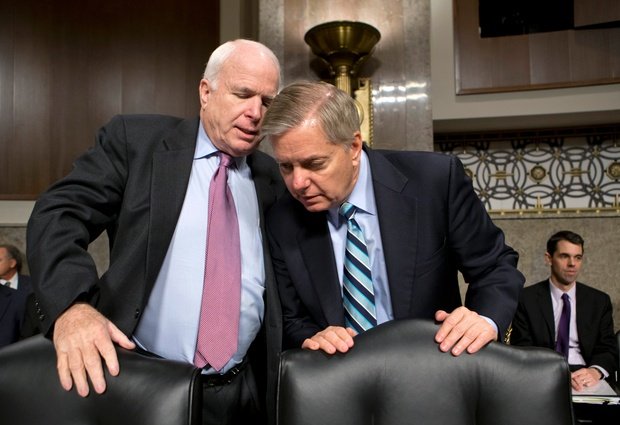 |
| "They're onto us on the war-mongering shit, Lindsey. We might have to come up with another form of bluster. I know it's a lot of work, but what the hell else are we gonna do?" |
My only hope is that somehow the Very Serious People come to terms with the fact that after 10-plus years of war, Americans are sick of it. It would be even better if the VSP admit that we've been a total, colossal failure at it.
I don't know what kind of world of denial Condoleezza Rice lives in, but Te-Nehisi Coates does:
Condoleezza Rice was an important member of an administration that launched a war on false pretense and willingly embraced torture. This was done in the name of the American people. It takes a particular historical blindness to claim that such actions should have no effect on all our crowing over "democracy and human rights."I've got a suspicion that Rice is as responsible as any in the Bush administration for trashing our reputation. Vietnam didn't help, but the world had forgotten. The Bushies drove the point home all over again.
That doesn't keep the likes of David Brooks from pretending that it's so bad we don't lead anymore, ignoring the fact that we just might not be the leader the world is looking for right now:
It’s frankly naïve to believe that the world’s problems can be conquered through conflict-free cooperation and that the menaces to civilization, whether in the form of Putin or Iran, can be simply not faced. It’s the utopian belief that politics and conflict are optional.
One set of numbers in the data leaps out. For decades Americans have been asked if they believe most people can be trusted. Forty percent of baby boomers believe most people can be trusted. But only 19 percent of millennials believe that. This is a thoroughly globalized and linked generation with unprecedentedly low levels of social trust.
I feel the need to apologize for quoting Brooks here, mostly because I don't know what the hell he's saying. I'm not sure that Brooks even knows. But Conor Friedersdorf does:We live in a country in which many people act as if history is leaderless. Events emerge spontaneously from the ground up. Such a society is very hard to lead and summon. It can be governed only by someone who arouses intense moral loyalty, and even that may be fleeting.
This point is being made with increasing insistence by the American public because they perceive, correctly, that there is a cadre of Washington, D.C. insiders—bureaucrats, military contractors, think-tank fellows, editors like Bill Kristol, writers like Max Boot—so oblivious to America's limits that they can't even see the last military intervention that they successfully advocated as a mistake, even though, in that case, the catastrophic results have already played out.
Brooks is a much more subtle thinker and insightful writer than any of these people. On matters of foreign policy and what he would call "national greatness," he is still unduly influenced by them, despite the fact that, more than any other actors in American life, they've destroyed the trust in leadership that Brooks himself values. Leaders that blunder into wars and subsequently lose them, at great cost in lives and treasure, forfeit their ability to lead. Their ideas lose esteem.
How could it be otherwise?You've got that right.
 |
| "In the struggle to get the world to hate our bullshit, America has prevailed." |

No comments:
Post a Comment